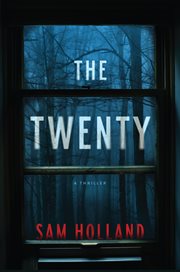Review by Booklist Review
The unsolved assassination of Swedish prime minister Olof Palme in 1986 lurks in the background of much Scandinavian noir, heralding a new era of crime that would shake the country to its core. So it is in this audacious mix of procedural and psychological thriller. On the night of Palme's death, another murder takes place in the village of Halland, a crime that comes to haunt the life of police detective Sven Jörgensson, who won't let go of the case and the two related murders that follow, even after his retirement. Carlsson's narrative jumps between 1986 and 2019, after Jörgensson's death, when a novelist called Moth returns to Halland and meets Jörgensson's former partner, Evy. Soon Moth has his own obsession with the decades-old murders and how much Evy and Jörgensson's son, Vidar, knows about them. Carlsson teases readers with the slow unraveling of what happened when, but in the process he deftly portrays the cauldron of repressed emotions roiling within all the principal characters, especially Vidar, who followed his father into the police. Crime fiction imbued with the inner bleakness of a Bergman film.
From Booklist, Copyright (c) American Library Association. Used with permission.
Review by Publisher's Weekly Review
In 2019, Moth, the protagonist of this intriguing if flawed crime novel from Carlsson (The Invisible Man from Salem), returns to his hometown of Tofta, Sweden, to write a novel about Sven Jörgensson, a police officer plagued until his death in 1991 with frustration about his failure to catch a serial murderer. Flashbacks to Sven's point of view at the time of the first two murders in 1986, and to the perspective of his son, Vidar, both as a child and a young officer following in Sven's footsteps without knowing his secrets, add real-time drama and psychological authenticity, both in Sven's palpable anguish and Vidar's struggles to understand Sven after his death. But in the present-day part of the story, in which Moth seeks to engage both Vidar and Evy Carlén, Sven's partner on the force, Moth never feels like a convincing character, despite his local connections being a resolution-driving source of previously unrevealed information. Nonetheless, Scandi noir fans will want to check this out. Agent: Christine Edhäll, Ahlander Agency (Sweden). (Jan.)
(c) Copyright PWxyz, LLC. All rights reserved
Review by Library Journal Review
In Amidon's Locust Lane, a young woman is found dead in the more fashionable section of a New England suburb, and the three teenagers who were with her that night are now suspects in her murder (100,000-copy first printing). From Carlsson, youngest winner of the Best Swedish Crime Novel of the Year, the internationally best-selling Blaze Me a Sun features a serial killer in a small Swedish town who commits his first murder the same night in 1986 when Prime Minister Olof Palme is assassinated. In a continuation of Cosimano's USA Today best-selling and Edgar--nominated series starring author and single mom Finlay Donovan, readers will find that Finlay Donovan Jumps the Gun; unexpectedly owing Russian mobsters a favor, she must help them identify a contract killer before the cops do, especially crucial because the killer might actually be a cop. In The Motion Picture Teller, a stand-alone from CWA Dagger winner Cotterill set in 1996 Bangkok, postman Supot and his best friend, video store owner Ali, discover a mysterious film titled Bangkok 2010 that no one seems to know anything about--and that might be cursed. In Jane Harper's Exiles, Australian federal investigator Aaron Falk--whom readers know from the New York Times best-selling Dry--senses fault lines among the close group of attendees at a party in South Australian wine country, owing to the disappearance of a friend whose baby was found abandoned at a busy festival. From the Edgar Award--winning Jordan Harper, Everybody Knows features publicist Mae Pruett, who makes sure that everybody doesn't know about the shady dealings of the lawyers and private security firms for which she works, now trying to discover the secret her boss took to his death. In You Must Remember This, from Edgar-nominated YA author Rosenfield, Miriam Gardiner's fall through thin ice one Christmas Eve in the spot where decades ago she used to meet a lover might be an accident or suicide, but motives for murder emerge when daughter Delphine starts looking into the entire family. In the New York Times best-selling Tracy's The Devil You Know, LAPD Detective Margaret Nolan faces a tough case with the suspicious death of popular actor Evan Hobbes in a Malibu rockslide just 24 hours after a fake video smashes up his career; the subsequent murder of his agent's brother-in-law suggests evil intent.
(c) Copyright Library Journals LLC, a wholly owned subsidiary of Media Source, Inc. No redistribution permitted.
Review by Kirkus Book Review
A serial killer in the Swedish town of Tiarp eludes the cop trying to track him down, then the cop's policeman son--and, 30 years after the unsolved murders, a successful novelist investigating them. It's 1986. The first victim, 20-year-old Stina Franzén, is found beaten and barely breathing in the back seat of an abandoned car by policeman Sven Jörgensson, who must live not only with his failure to find her killer, but also the accusation that he hastened her demise by improperly handling her body. Taunted on the phone by the so-called Tiarp Man--"I'm going to do it again"--Sven is further shaken by his inability to find the body of a second young murdered woman. Even as the killings are overshadowed by the shocking assassination of Swedish Prime Minister Olof Palme on the same night as Stina's demise, Sven becomes obsessed with the local cases--an obsession that will lead him down the darkest paths. His neglected son, Vidar, having failed to heed his father's warning that becoming a cop will make him cold and distant like his old man, discovers troublesome details about Sven's pursuit of the killer. The novelist, who narrates Carlsson's book, uncovers more disturbing secrets after meeting up with Vidar, a one-time schoolmate of his, and Evy Carlén, Sven's one-time partner on the force and would-be lover. The plot unfolds slowly but masterfully, with serial surprises. But what makes Carlsson's American debut so impressive is its close examination of "truth," the way trauma is passed from one generation to the next, the distractions we create to avoid our contributions to the "rot" of our violent age. Pain can be so deep, Carlsson writes, "maybe it's not even pain anymore. It's a way of being." A brainy page-turner from a rising star in Scandinavian crime fiction. Copyright (c) Kirkus Reviews, used with permission.
Copyright (c) Kirkus Reviews, used with permission.


